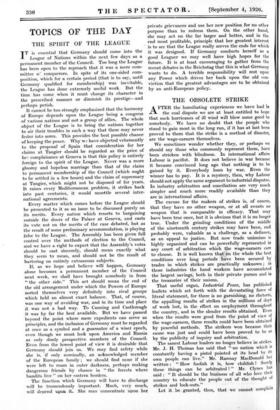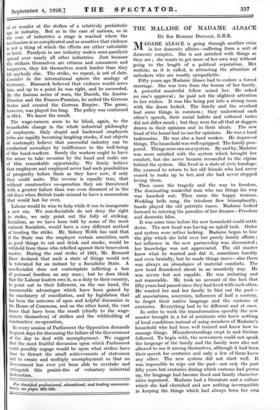THE OBSOLETE STRIKE
AFTER the humiliating experiences we have had in the coal dispute we are at least entitled to hope that such hurricanes of ill wind will blow some good to somebody. We have no doubt that the people who stand to gain most in the long run, if it has at last been proved to them that the strike is a method of disaster, are the wage-earners themselves.
We sometimes wonder whether they, or perhaps we should say those who commonly represent them, have been stricken with blindness. In international affairs Labour is pacifist. It does not believe in war because it became convinced long ago that nothing is to be gained by it. Everybody loses by war. Even the winner has to pay. It is a mystery, then, why Labour should not apply the same argument to industrial disputes. In industry arbitration and conciliation are very much simpler and much more readily available than they are in international affairs.
The excuse for the makers of strikes is, of course, that they have no other weapon, or at all events no weapon that is comparable in efficacy. That may have been true once, but it is obvious that it is no longer true. Under the grinding conditions of the middle of the nineteenth century strikes may have been, and probably were, valuable as a challenge, as a defiance, as an appeal to justice. But now trade unionism is highly organized and can be powerfully represented in any court of arbitration which the wage-earners care to choose. It is well known that on the whole the best conditions over long periods have been secured b3i trades in which strikes are practically unknown ; ii those industries the hand workers have accumulated the largest savings, both in their private purses and in the treasuries of their unions.
That useful organ, Industrial Peace, has published leaflets which set forth with the devastating -force of literal statement, for there is no garnishing, no rhetoric, the appalling results of strikes in the millions of days of work lost, in the effect on employment throughout the country, and in the slender results obtained. Even when the results were good from the point of view a the wage-earners, these results could have been obtained by peaceful methods. The strikers won because their cause was just and could have been proved to be so by the publicity of inquiry and arbitration.
The sanest Labour leaders no longer believe in strikes. Mr. J. H. Thoinas has said that "- no nation which is constantly having a pistol pointed at its head by its -own people can live." Mr. Ramsay MacDonald lia written : "How foolish it is, how childish ! Surely these things can be arbitrated ! " Mr. Clynes has said : "It should be the business of all who love their country to educate the people out of the thought of strikes and lock-outs."
Let it _be_ granted, then, that we cannot complain a or wonder at the strikes of a relatively prehistoric age in industry. But as in the case of nations, so • in the case of industries a stage is reached where the mechanism is so complicated and so sensitive that violence is not a thing of which the effects are either calculable or brief. Paralysis in one industry makes semi-paralysis spread over nearly all other industries. Just because-- the strikers themselves are citizens and consumers and taxpayers, they hit themselves much harder than they hit anybody else. The strike, we repeat, is out of date. Consider in the international sphere the analogy of Germany. Bismarck believed that violence would serve him, and up to a point he was right, and he succeeded. By the famous series of wars, the Danish, the Austro- Prussian and the Franco-Prussian, he united the German States and created the German Empire. The game, however, was played too long. The policy was continued in 1914. We know the result.
The wage-earners seem to be blind, again, to the remarkable change in the whole industrial philosophy of employers. Only stupid and backward employers (who are rapidly becoming laughing stocks, if not objects of contempt) believe that successful industry can be conducted nowadays by indifference to the well-being of the hand-workers. Surely the workers ought to have the sense to take occasion by the hand and make use of this remarkable opportunity. We firmly believe that employers and employed never had such possibilities of prosperity before them as they have now, if only they could unite. The reverse is equally true, that without constructive co-operation they are threatened with a greater failure than was even dreamed of in the old days when British trade seemed to have a momentum that would last for ever.
Labour would be wise to help while it can to inaugurate a new era. We non-Socialists do not deny the right to strike, we only point out the folly of striking. Socialism, as we have been told by some of the most eminent Socialists, would have a very different method of treating the strike. Mr. Sidney Webb has said that if the State was the employer certain amenities, such as good things to eat and drink and smoke, would be withheld from those who rebelled against their benevolent master. During the coal strike of 1921, Mr. Bernard Shaw declared that such a state of things would not he tolerated for an instant by a Socialistic State. A non-Socialist does not contemplate inflicting a loss of personal freedom on any man ; but he does think that the Labour leaders owe it, as a duty to their country, to point out to their followers, on the one hand, the innumerable advantages which have been gained by the machinery of conciliation, and by legislation that has been the outcome of open and helpful discussion in the House of Commons, and on the other hand, the vast losses that have been the result (chiefly to the wage- itrriers themselves) of strikes and the withholding of Constructive co-operation, In every session of Parliament the Opposition demands frequent days for discussing the failure of the Government of the day to deal with unemployment. We suggest that the most fruitful discussion upon which Parliament could possibly engage would be upon what strikes have done to thwart the small achievements of statesmen and to create and multiply unemployment so that no Government has ever yet been able to overtake and extinguish this prairie-fire of voluntary industrial destruction.



































 Previous page
Previous page